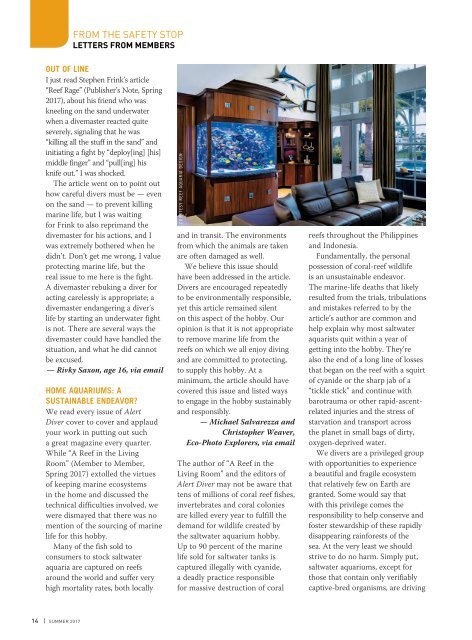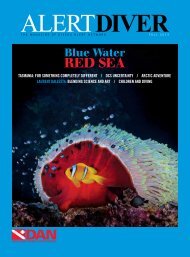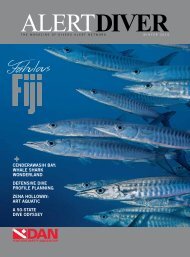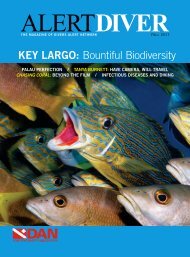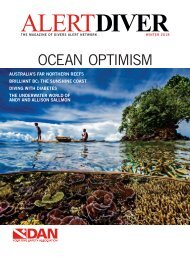AD 2017 Q3
Alert Diver is the dive industry’s leading publication. Featuring DAN’s core content of dive safety, research, education and medical information, each issue is a must-read reference, archived and shared by passionate scuba enthusiasts. In addition, Alert Diver showcases fascinating dive destinations and marine environmental topics through images from the world’s greatest underwater photographers and stories from the most experienced and eloquent dive journalists in the business.
Alert Diver is the dive industry’s leading publication. Featuring DAN’s core content of dive safety, research, education and medical information, each issue is a must-read reference, archived and shared by passionate scuba enthusiasts. In addition, Alert Diver showcases fascinating dive destinations and marine environmental topics through images from the world’s greatest underwater photographers and stories from the most experienced and eloquent dive journalists in the business.
Create successful ePaper yourself
Turn your PDF publications into a flip-book with our unique Google optimized e-Paper software.
FROM THE SAFETY STOP<br />
LETTERS FROM MEMBERS<br />
OUT OF LINE<br />
I just read Stephen Frink’s article<br />
“Reef Rage” (Publisher’s Note, Spring<br />
<strong>2017</strong>), about his friend who was<br />
kneeling on the sand underwater<br />
when a divemaster reacted quite<br />
severely, signaling that he was<br />
“killing all the stuff in the sand” and<br />
initiating a fight by “deploy[ing] [his]<br />
middle finger” and “pull[ing] his<br />
knife out.” I was shocked.<br />
The article went on to point out<br />
how careful divers must be — even<br />
on the sand — to prevent killing<br />
marine life, but I was waiting<br />
for Frink to also reprimand the<br />
divemaster for his actions, and I<br />
was extremely bothered when he<br />
didn’t. Don’t get me wrong, I value<br />
protecting marine life, but the<br />
real issue to me here is the fight.<br />
A divemaster rebuking a diver for<br />
acting carelessly is appropriate; a<br />
divemaster endangering a diver’s<br />
life by starting an underwater fight<br />
is not. There are several ways the<br />
divemaster could have handled the<br />
situation, and what he did cannot<br />
be excused.<br />
— Rivky Saxon, age 16, via email<br />
HOME AQUARIUMS: A<br />
SUSTAINABLE ENDEAVOR?<br />
We read every issue of Alert<br />
Diver cover to cover and applaud<br />
your work in putting out such<br />
a great magazine every quarter.<br />
While “A Reef in the Living<br />
Room” (Member to Member,<br />
Spring <strong>2017</strong>) extolled the virtues<br />
of keeping marine ecosystems<br />
in the home and discussed the<br />
technical difficulties involved, we<br />
were dismayed that there was no<br />
mention of the sourcing of marine<br />
life for this hobby.<br />
Many of the fish sold to<br />
consumers to stock saltwater<br />
aquaria are captured on reefs<br />
around the world and suffer very<br />
high mortality rates, both locally<br />
COURTESY REEF AQUARIA DESIGN<br />
and in transit. The environments<br />
from which the animals are taken<br />
are often damaged as well.<br />
We believe this issue should<br />
have been addressed in the article.<br />
Divers are encouraged repeatedly<br />
to be environmentally responsible,<br />
yet this article remained silent<br />
on this aspect of the hobby. Our<br />
opinion is that it is not appropriate<br />
to remove marine life from the<br />
reefs on which we all enjoy diving<br />
and are committed to protecting,<br />
to supply this hobby. At a<br />
minimum, the article should have<br />
covered this issue and listed ways<br />
to engage in the hobby sustainably<br />
and responsibly.<br />
— Michael Salvarezza and<br />
Christopher Weaver,<br />
Eco-Photo Explorers, via email<br />
The author of “A Reef in the<br />
Living Room” and the editors of<br />
Alert Diver may not be aware that<br />
tens of millions of coral reef fishes,<br />
invertebrates and coral colonies<br />
are killed every year to fulfill the<br />
demand for wildlife created by<br />
the saltwater aquarium hobby.<br />
Up to 90 percent of the marine<br />
life sold for saltwater tanks is<br />
captured illegally with cyanide,<br />
a deadly practice responsible<br />
for massive destruction of coral<br />
reefs throughout the Philippines<br />
and Indonesia.<br />
Fundamentally, the personal<br />
possession of coral-reef wildlife<br />
is an unsustainable endeavor.<br />
The marine-life deaths that likely<br />
resulted from the trials, tribulations<br />
and mistakes referred to by the<br />
article’s author are common and<br />
help explain why most saltwater<br />
aquarists quit within a year of<br />
getting into the hobby. They’re<br />
also the end of a long line of losses<br />
that began on the reef with a squirt<br />
of cyanide or the sharp jab of a<br />
“tickle stick” and continue with<br />
barotrauma or other rapid-ascentrelated<br />
injuries and the stress of<br />
starvation and transport across<br />
the planet in small bags of dirty,<br />
oxygen-deprived water.<br />
We divers are a privileged group<br />
with opportunities to experience<br />
a beautiful and fragile ecosystem<br />
that relatively few on Earth are<br />
granted. Some would say that<br />
with this privilege comes the<br />
responsibility to help conserve and<br />
foster stewardship of these rapidly<br />
disappearing rainforests of the<br />
sea. At the very least we should<br />
strive to do no harm. Simply put,<br />
saltwater aquariums, except for<br />
those that contain only verifiably<br />
captive-bred organisms, are driving<br />
14 | SUMMER <strong>2017</strong>


